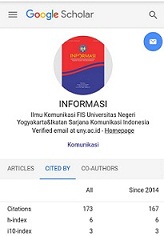KOMODIFIKASI SEKSUAL DALAM KEPENTINGAN EKONOMI PORTAL BERITA ONLINE
DOI:
https://doi.org/10.21831/informasi.v45i2.7990Keywords:
Commodification, Online Media, SexualityAbstract
Press entered a new era. It is characterized by developing online media. By nature papperless online media to be more efficient in operation. To disseminate content that they are prepared, generally the online media managers utilizing social media such as facebook, twitter, or etc. But not only leave it there, the content is spread also equipped with something that is able to attract the reader's attention. Even able to make the social media users who happen to view such content terpersuasi to click on the content. Generally seasoning the attention it is the things that are controversial (that it contains elements of sexuality). There has been a sexual commodification process undertaken by several online news portals to get as visitors. It confirms Marx and Mosco of commodification as a change of the exchange rate.
Dunia pers memasuki era baru. Hal ini ditandai dengan berkembangkan media online. Dengan sifatnya yang papperless media online lebih hemat dalam pengoperasiannya. Dalam proses menyebarluaskan konten-konten yang mereka siapkan, umumnya para pengelola media online memanfaatkan media sosial seperti facebook, twitter, atau yang sejenisnya. Namun, konten yang disebarkan turut dibekali dengan sesuatu yang mampu menarik perhatian pembaca. Bahkan mampu membuat para pengguna media sosial yang kebetulan melihat konten tersebut terpengaruh untuk melihat konten tersebut. Umumnya bumbu penarik perhatian itu adalah hal-hal yang sifatnya kontroversi (mengandung unsur seksualitas). Telah terjadi proses komodifikasi seksual yang dilakukan oleh beberapa portal berita online untuk mendapatkan pengunjung sebanyak-banyaknya. Hal ini membenarkan pernyataan Marx dan Mosco tentang komodifikasi sebagai perubahan dari nilai tukar.
References
Barker, Chris. 2009. Cultural Studies,Teori dan Praktik. Yogyakarta: Kreasi Wacana.
Beilharz, Peter. 2005. Teori-Teori Sosial. Yogyakarta: Pustaka Pelajar.
Joli Jensen. 1992. Adoring Audience Fan Culture and Popular Media. London: Routledge.
Littlejohn. 2004. Teori Komunikasi. Jakarta: Salemba Humanika.
McQuail, Denis. 1994. Mass Communication Theory. London: Sage Publications Ltd
Mosco, Vincent. 2009. The Political Economy of Communication Second Edition. London: Sage Publications Lt.
Oscar, Gandy Jr, 1990. "˜Tracking the Audience' in Questioning Media: a Critical Introduction. London: Sage Publication.
Storey, John. 2010. Cultural Studies dan Kajian Budaya Pop: Pengantar Komprehensif Teori dan Metode. Yogyakarta: Jalasutra.
Downloads
Published
How to Cite
Issue
Section
Citation Check
License
Authors who publish with this journal agree to the following terms:
- Authors retain copyright and grant the journal right of first publication with the work simultaneously licensed under a Creative Commons Attribution License that allows others to share the work with an acknowledgement of the work's authorship and initial publication in this journal.
- Authors are able to enter into separate, additional contractual arrangements for the non-exclusive distribution of the journal's published version of the work (e.g., post it to an institutional repository or publish it in a book), with an acknowledgement of its initial publication in this journal.
- Authors are permitted and encouraged to post their work online (e.g., in institutional repositories or on their website) prior to and during the submission process, as it can lead to productive exchanges, as well as earlier and greater citation of published work (See The Effect of Open Access).












